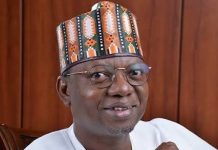COVID-19 is ravaging our land and destroying the economy. In the mean time, the economy is under-performing. The country has gradually continued to slip back. There is a shortfall on our oil revenue. Nigeria’s foreign capital inflow has sunk to 9.68 billion dollars, the lowest in four years. The International Monetary Fund (IMF) says Nigeria’s economy is at “critical juncture” and has urged for VAT hike.
The central government has hinted to fund the budget from other means apart from oil which is the country’s economic main stay. There is even a discussion by the government to commence the sale of assets in ten state owned corporations, a move that will generate about $800milion dollars. There is the urgent need for us to cut our coat to our sizes. If you cut your coat according to your situation, you limit what you do to the account of your resources. Action should suit circumstances or resources. Is there any need for us to sustain the bicameral system of legislature we are operating now?
Bicameralism is the practice of having a legislature divided into two separate assemblies, chambers, or houses, known as a bicameral legislature. Bicameralism is distinguished from unicameralism, in which all members deliberate and vote as a single group. As of 2015, about 40% of world’s national legislatures are bicameral, and about 60% are unicameral.
Bicameral system of legislature means running the Senate and House of Representative pari passu. Experts have listed the advantages and disadvantages of bicameral legislature. Bicameral legislatures make it possible for better laws to be made in the country, since bills are somewhat properly debated in bicameral legislature. It is difficult for the executive arm to dominate the two chambers, the second chamber of bicameral legislature reduces the work load of the upper house, Bicameral legislature makes room for equal and adequate representation of the people in a federal state, The second chamber of bicameral legislature checks and prevents hasty and ill-considered passage of bills unlike in the case of a unicameral legislature, The second chamber of a bicameral legislature corrects any faulty legislation coming from the first chamber, Bicameral legislatures protects the interests of minority groups, A bicameral legislature makes it possible for public opinion to be properly expressed on the issues concerned before bills are passed by delaying the bills in the two chambers. Bicameral legislatures result in division of labour in certain aspects of the functions performed by the legislature between the two legislative chambers, Bicameral legislatures create room for more politically and administratively experienced people to be useful in the art of law making. The second chamber of bicameral legislature checks the excesses and guides against the tyranny or dictatorship of a one chamber.
The Disadvantages of Bicameral Legislature: The second chamber of bicameral legislature may be used as a dumping ground for political rejects at the polls, if its membership is by nomination or appointment. A bicameral legislature encourages duplication of functions, since they perform the same function; bicameral legislatures waste a lot of public fund because the government will try to maintain the two legislative chambers and the paraphernalia that go with it; a bicameral legislature is not good for passing bills in times of emergency because of delays that result from having two chambers. Many legislators have to go through the bills before they are passed or carried out, bicameral legislatures lead to unnecessary rivalry as to which of the two houses is superior to the other, in a bicameral legislature, most of the members assigned in the second chamber have advanced in age and are mostly inactive. Appointment rather than election of members of the upper house as it is done in Britain is undemocratic. This is another disadvantage of a bicameral legislature and Bicameral legislatures cause a serious delay in the act of law making. But above all it saves cost in the act of running of government.
In spite of all these advantages and disadvantages, can our economy sustain the Presidential system of government we are running now? Unicameral systems became more popular during the 20th century and some countries, including Greece, New Zealand, and Peru, switched from a bicameral to a unicameral. Ghana, our neighbor, practices unicameral. That does not make these countries less democratic than we are.
What we are discussing is the reduction in the cost of governance. The Presidential System of government we are running is too expensive and it will lead us to nowhere. Apart from bicameralism or unicameralism, there is also the need to address whether or not we can continue the Presidential System of Government. The Presidential System of Government has given too wide powers to the centre. We are not discussing about the perpetual Constitution amendment, that has given opportunity to the deputy Senate President and the deputy speaker of the House of Representatives and members of their committees since 1999 to make some gains. We are discussing whether or not this Presidential System suit us. We adopted this system of government in haste. It was faulty. It was fallacious. And that is why it is not working and it cannot work no matter how long we practice it. Certainly the Presidential System of Government is not the major cause of our problems but it has worsened our crises. No consultation with the people on the new adventure, no mandate of the people. The House has fallen but we can pretend that it has not. But we can still do something about it if we are determined. For example since 1978, all countries in Latin America have either changed or replaced their constitutions. Why should our own be different.
Let’s go back to how we adopted the Presidential system of government. After overthrowing General Yakubu Gowon, GCFR, in a Military coup, the then Head of State, Brigadier Murtala Mohammed, GCFR, on July 30, 1975, announced that his government will come out with a political programme. On October 1, 1975, Brigadier Murtala Mohammed in a broadcast to the nation declared “One important subject before us is, of course, the question of a Political Programme. I promised in my last address to announce a programme, and the Government has since then given considerable thought to this matter. The ultimate aim is to forge a viable political system, which will be stable and responsive enough to needs and realities of this country. This is not an exercise that begins and ends in the mere drafting of a constitution. Viable political institutions only emerge from hard experience and practice and the corporate experience of all is what matters. It is, therefore, my belief that our immediate task is to set the stage for this corporate effort to work on a new constitution. Whatever the outcome, the decision has to be made democratically, openly and by all. With this in mind, the Supreme Military Council has approved a five-programme design to ensure a smooth transition to civil rule by those elected by the people of the country”.
To be continued tomorrow
Teniola, a former director at the presidency wrote from Lagos.













